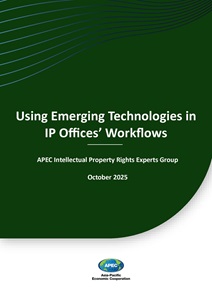
Reports
Using Emerging Technologies in IP Offices’ Workflows
The Asia-Pacific Economic Cooperation (APEC) is a regional economic forum established in 1989 to leverage the growing interdependence of the Asia-Pacific.
The Asia-Pacific Economic Cooperation (APEC) is a regional economic forum established in 1989 to leverage the growing interdependence of the Asia-Pacific.
APEC ensures that goods, services, investment and people move easily across borders. Members facilitate this trade through faster customs procedures at borders; more favorable business climates behind the border; and aligning regulations and standards across the region.
APEC ensures that goods, services, investment and people move easily across borders. Members facilitate this trade through faster customs procedures at borders; more favorable business climates behind the border; and aligning regulations and standards across the region.
APEC works to help all residents of the Asia-Pacific participate in the growing economy.
APEC works to help all residents of the Asia-Pacific participate in the growing economy.
Capacity building projects play an important role in helping translate APEC's goals into reality.
Capacity building projects play an important role in helping translate APEC's goals into reality.

Reports
•September 2024
Download Report
1MB
Published Under
SOM Steering Committee on Economic and Technical Cooperation (SCE), Transportation Working Group (TPTWG)
Accessed
949
Pages
42
This report provides an overview of the research conducted for the Promoting Innovative Greenhouse Gas Emissions Reduction Policies and Practices in the Asia-Pacific Economic Cooperation Region through the Traveler Behavioral Change project. The report pulls insights from APEC economies using a survey of eight questions. A literature review helped to inform the themes of the questions to address strategies that influence behavior. The survey was distributed through APEC delegates to all APEC economies. Ultimately, 14 government agencies completed the survey. The economies that provided completed surveys include: Australia; Canada; Chile; New Zealand; the Philippines; Singapore; Chinese Taipei; Thailand; and the United States. These discussions resulted in additional discussions on policies and strategies that encourage travelers to use lower emission mode options. Major themes in changing traveler behavior include land use planning, availability and quality of active transportation, creating and supporting economic conditions for electric vehicles, and investments in transit.

